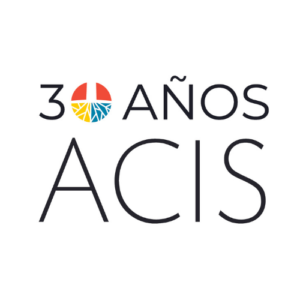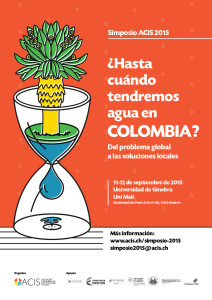On November 2nd and 3rd 2012, the Colombian Association of Researchers in Switzerland (ACIS, in Spanish), in partnership with the cooperation unit (CODEV) of the Swiss Institute of technology Lausanne (EPFL), the Colombian Embassy in Switzerland and Colciencias , organized at the Polydôme in Lausanne its 2nd Symposium on the bilateral academic and scientific relations between Switzerland and Colombia. The event was also a celebration of its 20th anniversary.
The conference brought together researchers, students, and representatives from academia, government and research funding agencies. ACIS was the first association of researchers created by the Colombian diaspora and has inspired a network of researchers’ associations in several other countries (Red Caldas) . ACIS history was presented by one of its founders and main sponsors Prof. Eduardo Sánchez as opening to the event.
Over 100 attendees heard presentations in the topics of engineering, natural sciences, transfer of technologies, life sciences, environmental sciences, social sciences, architecture and arts. A two days heavily-charged program was followed, comprising of 29 oral presentations and three poster sessions. In addition, on the first day, a global discussion followed by a round table of institutional and scientific stakeholders from Colombia and Switzerland was held. During this session, subjects such as partner identification, program selection criteria and success indicators, the strengthening of private-public partnerships in research and cooperation, were discussed at length in a lively environment.
During the two days, an interesting set of projects were presented. Some of them were part of broader cooperation program such as the EPFL-UNIVALLE program in the environmental field which inception phase was lively presented by Prof. César Pulgarín. The program executed 10 projects with a budget around 6-7 millions CHF, formed 25 PhD, 35 master and 40 undergraduate students, along with numerous publications in prestigious peer-reviewed journals. As a natural consequence, the biannual EPFL-Univalle plan now provides a funded platform for a project-based academic exchange and it was extended to other fields of science. Dr. Luc Patiny, presented this new phase and his projects on chemical information and bioreactor control. Other presentations were related to isolated initiatives, often born out of the interest of Colombian PhD students and their advisors. In that line, Prof. Ian Sanders presented his project about biotechnology crop enhancement followed by a moving video about his experience with rural students in conflict areas. Other presentations featured the work of famous Colombian Architect Simon Velez as seen by his Swiss colleague Prof. Pierre Frey; the work of Dr. Chavarriaga, former ACIS president, using neuroprostethics to help Colombian population with motor disabilities; the Swiss-Colombian? partnership for precision agriculture, presented by Dr. Andrés Perez; a project proposal for continuous education and joint research governance by Prof. Patrick Renz. The list is extensive and so are the subjects: biomedical research, air pollution, humanitarian demining, particle physics, waste management, migration, and many more. Most of the presentations will soon be available in pdf format and in video through www.acis.ch.
ACIS deeply believe that research and creativity must go hand in hand with artistic and cultural expressions. Art and culture are valid subjects of scientific inquiry and –in a sense– art in itself can be conceived as a subjective research into human nature. In that spirit, an exhibition by Colombian painters, among whom Miler Ramírez, Mario Volpe and Filomeno Hernández took place along the event.
During the symposium, the new funding framework for science, technology and innovation in Colombia was brought to the table by Dr. Pablo Patiño from Colciencias. Under the National Development Plan 2010-2014 a significant share of royalties (4,294.8 million CHF for 2012) from mineral and hydrocarbon extraction will be devoted to research projects. These funds will be directly managed by regional entities that often lacks of adequate project management and academic infrastructures. This scenario poses a risk of misuse or inefficiency but also implies a new set of opportunities. In particular, one of the symposium’s conclusions about the future role of ACIS is that the association can become a facilitator in the peer-review process of the scientific quality of some of these new projects.
Another relevant conclusion of the event is that Colombia cannot be considered any more as a playground for north-based researchers or a passive receptor of foreign-developed technology. Colombia is in fact a laboratory for a new kind of cooperation that avoids paternalism and favour symbiosis and complementarities. This cooperation needs institutional and individual support to take advantage from existing platforms and to replicate successful alternatives. In that perspective, ACIS role can be seen not only as a source of relevant information but as bridge between students, researchers and academic and financial institutions from both countries. There is a perceived need from Colombian researchers to move forward towards making Colombia one of the priority countries for scientific cooperation for the Swiss government. From the Swiss side, the official trend is to reduce the number of priority countries and favour instead inter-agency cooperation. In that sense, the Univalle-EPFL program, presented in one of the conferences, can be shown as a role model for this kind of agreement.
In the end, the event highlighted the great potential and motivation of Colombian young researchers to deepen the links already established in the field of scientific cooperation and development. There is reason for hope then; a new generation is in position of making a substantial and objective contribution to the peace of our country through international cooperation.
__
Merry Christmas and best wishes for 2013,
Steering board ACIS
__
For further information regarding this press release, please contact our representatives:
Press contacts:
Juliana León, juliana.leon@acis.ch, +41798267691 Languages : English, Spanish, French
Juan David Villegas, juan.villegas@acis.ch, +41796072333 Languages : English, Spanish, French

